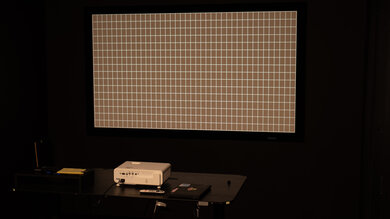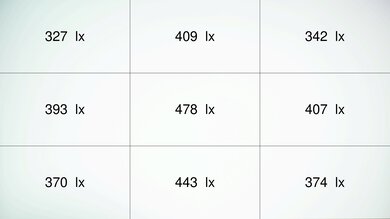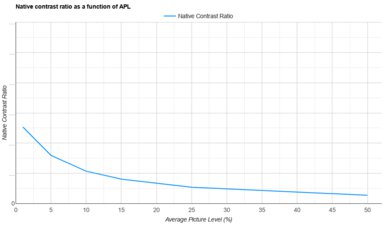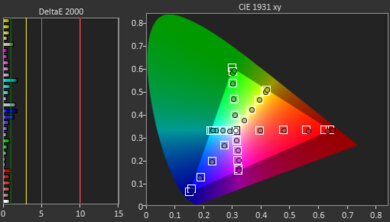
Are you cramped for space? Do you have a massive room and don't want your projector to stick out right in the middle of it? Consider a short-throw (ST) or ultra-short-throw (UST) projector. These projectors can be installed very close to the wall or screen you wish to project on as an alternative to the traditional long-throw projectors, which you have to install far from the screen. Short-throw projectors have numerous advantages; they don't require as much space, their proximity to the screen helps with cable management, and they just offer a more minimalist setup over traditional projectors. However, short-throw projectors are often more expensive than other projector types, so consider that when shopping.
We're here to help. We've bought and tested more than 45 projectors, and below, you'll find the best ST and best UST projectors to buy, but remember that we only cover consumer models, not high-end products meant for enthusiasts. If you're shopping for a home theater projector and don't care whether it's a short-throw projector, check out the best models for home theater use. If you find these projectors too expensive for what they offer and would prefer a cheaper option, check out the best budget and cheap projectors. Taking your projector on the patio? Consider our picks for the best outdoor projectors. And don't forget—you can even vote on which projectors you'd like us to purchase and put to the test!
-
Best Short-Throw Projector
Movies7.8Brightness6.7Contrast8.1Minimum Throw Ratio0.69Maximum Throw Ratio0.83Portability5.0Light SourceLEDResolutionPixel Shift 4kLooking for the best short-throw projector? Look no further than the BenQ X500i. It uses its 4k pixel-shifting technology to project a sharp 60-inch image at a distance of about three feet and up to 120 inches at a distance of six to 7.2 feet. It's certainly no slouch when it comes to image quality, as its contrast is great, and it particularly excels in darker scenes, although it's still quite decent in brighter scenes. It also has a wide color gamut, leading to a vibrant image, although it's not quite bright enough to really make those colors truly pop. Finally, the projector is exceedingly accurate, so much so that even purists won't need to calibrate it.
This projector is packed with features. It comes with BenQ's Android TV 11 QS02 streaming dongle, which is fully cast capable through Google Chromecast and Apple AirPlay. The dongle has Wi-Fi 6, Bluetooth 5.0, HDR10+ capability, and natively supports Netflix. The projector has two HDMI ports, with another one hidden behind the top cover, each capable of up to 4k @ 60Hz and 1080p @ 240Hz gaming, with the second HDMI port also doubling as an eARC port. It also has a USB-C port with DP Alt Mode, so you can use it to directly project content from a connected compatible device. Overall, this is easily the best-value short-throw projector you can buy.
-
Best Ultra-Short-Throw Projector
Movies8.1Brightness7.8Contrast8.3Minimum Throw Ratio0.22Maximum Throw Ratio0.22Portability4.0Light SourceLaserResolutionPixel Shift 4kWhat if you want to place your projector extra close to the screen? Or what if you have a smaller room and don't have space for a regular long-throw projector? Then you'll need an ultra-short-throw projector like the Hisense PX3-PRO. It can project a 90-inch image from just 6.6 inches away and up to a 130-inch image at 14.3 inches. If you're looking for a great option for a home theater setup, the PX3-PRO is a solid choice, too, thanks to its great contrast, which is more than enough for an immersive viewing experience in darker rooms. While its out-of-the-box color accuracy is just acceptable, it's good enough for most people, and purists can calibrate it for near-perfect results. What really makes it stand out, though, is its colors—it has the widest color gamut of any projector we've tested, so HDR content looks incredibly vibrant and lifelike.
The built-in Google TV smart OS is another bonus, meaning you won't need a streaming stick to access your favorite apps. Gamers will love the two HDMI 2.1 ports, which support 4k @ 120Hz or 1080p @ 240Hz, making it a great choice for high-performance gaming. It also features a decent 50W speaker system but includes an extra HDMI 2.0 port with eARC if you want to connect a soundbar. Plus, it has Wi-Fi 6E, Bluetooth 5.3, and casting support with Chromecast and AirPlay 2. With its stunning color performance, gaming-friendly features, and solid smart OS, the PX3-PRO is the best ultra-short-throw projector you can get.
-
Best Bright Room Short-Throw Projector
Movies7.7Brightness8.7Contrast7.2Minimum Throw Ratio0.16Maximum Throw Ratio0.16Portability3.5Light SourceLaserResolutionPixel Shift 4kWant a bright room projector? The Hisense PX3-PRO is bright enough for a room with a few lights, but if you're after the brightest unit possible, consider the Epson EpiqVision Ultra LS800 instead. It's one of the brightest projectors we've tested, so you don't need to worry about turning off the lights when using it. It also performs well in pitch-black rooms thanks to its decent contrast. Like the Hisense, it projects a sharp image using 4k pixel-shifting technology. Its color gamut and accuracy are both satisfactory, so while this projector has no major weaknesses in terms of image quality, outside of its brightness, it doesn't have any standout strengths either. One possible exception is its projection distance: it can project an 80-inch image from only 0.9 inches away or a 150-inch image from 9.9 inches, making it even more versatile than the Hisense when it comes to placement.
It's also packed with features, including built-in Android TV with full Chromecast integration. It even has a decent 2.1 speaker system from Yamaha, although we recommend a home theater speaker system for maximum impact. It has three HDMI ports, including an ARC port. All HDMI ports can accept a 4k @ 60Hz signal, but the third one also supports a 1080p @ 120Hz signal. The projector also features Bluetooth 5.0 and Wi-Fi 5. Overall, if you need a projector for a brighter room, the Epson EpiqVision Ultra LS800 is a better choice than the Hisense PX3-PRO.
-
Best 1080p Short-Throw Projector
Movies7.6Brightness8.3Contrast6.7Minimum Throw Ratio0.27Maximum Throw Ratio0.27Portability4.0Light SourceLaserResolution1080pIf you like the Epson EpiqVision Ultra LS800 but find it too expensive, consider its step-down model, the Epson EpiqVision Ultra LS300. They're very similar products overall, but the LS300 projects a 1080p image instead of the pixel-shifted 4k of the LS800. This means it doesn't look quite as sharp, but it's otherwise very similar: extremely bright, with alright contrast and a decent color gamut. One thing it does have over its more expensive sibling is a much more accurate image out of the box, making it a great option if you don't want to worry about calibrating your new projector. Finally, it's also an ultra-short-throw projector, projecting a 60-inch image from a distance of only 1 inch up to a 120-inch image from a distance of 15.2 inches.
It also doesn't skimp on features, as it comes with a fully functioning Android TV OS with full Chromecast integration. It has two HDMI ports, both capable of 1080p at 60Hz, with one doubling as an ARC port. It also has Wi-Fi, Bluetooth, a USB data port for playing videos directly from a USB key, and an optical out port. Ultimately, while it's not quite as well-rounded as the BenQ X500i, it's way brighter, making it a better fit for brighter rooms. It offers a lot of what makes the LS800 great but at a cheaper price.
-
Best Budget Short-Throw Projector
Movies7.1Brightness6.2Contrast7.2Minimum Throw Ratio0.69Maximum Throw Ratio0.83Portability5.0Light SourceLampResolution1080pYou don't need to empty your bank account to get a decent short-throw projector, as the BenQ TH671ST offers a satisfactory experience for a budget price. Of course, you're sacrificing some image quality compared to the products above, as its brightness is mediocre, so it looks washed out when the lights are on. Luckily, its contrast is satisfactory, offering a pleasant viewing experience in darker rooms. It's also colorful, and its pre-calibration color accuracy is great. It projects a 60-inch image at a distance of about three feet and up to a 180-inch image at about nine feet.
The projector is a bit light on features: it doesn't support Bluetooth or Wi-Fi out of the box and doesn't have a smart OS. It has only one 5W speaker, so you need a soundbar to get adequate sound. When it comes to ports, it has two HDMI 1.4 ports, and both can project up to 1920x1200 or 1080p @ 60Hz. The second HDMI port has MHL support, so you can directly plug your phone or tablet into that port to stream your screen to the projector. Finally, it has a mini USB service port and a USB Type-A port for power delivery. Ultimately, this model is of great value as long as you can deal with its longer projection range.
Notable Mentions
- BenQ TK700STi:
The BenQ TK700STi is a decent alternative to the BenQ TH671ST or the BenQ X500i, especially for gamers due to its 1080p @ 240Hz capabilities (although the X500i matches it there). Otherwise, the X500i is better overall due to its much better contrast, wider color gamut, and superior pre-calibration accuracy.
See our review - Formovie THEATER:
The Formovie THEATER is a tremendous dark room performer, even beating the Hisense PX3-PRO for contrast. However, the Hisense is brighter, has a wider color gamut, and has more features for gamers and streamers, making it the better option for most people.
See our review - NexiGo Aurora Pro:
The NexiGo Aurora Pro is a very good projector, especially for darker rooms, due to its truly excellent contrast. Unfortunately, it has a minimalistic Android TV implementation and is very inaccurate out of the box, making the Hisense PX3-PRO the better option for most people.
See our review
Recent Updates
-
We made sure that our recommendations are still accurate and available for purchase.
-
Ensured that our picks are all still available for purchase.
-
Due to its incredible versatility, the Hisense PX3-PRO is now our 'Best Ultra-Short-Throw Projector.' The Epson EpiqVision Ultra LS800 is now the 'Best Bright Room Short-Throw Projector,' and the Epson EpiqVision Ultra LS300 is the 'Best 1080p Short-Throw Projector.' The NexiGo Aurora Pro has been pushed to the Notable Mentions.
-
Verified that all of our picks are still widely available for purchase.
-
We improved the conciseness of our picks and again made sure that they were all available for purchase in the United States.
All Reviews
Our recommendations above are what we think are currently the best-short and ultra-short-throw projectors for most people to buy. We factor in the price (a cheaper projector wins over a pricier one if the difference isn't worth it), feedback from our visitors, and availability (no models that are difficult to find or almost out of stock everywhere).
If you'd like to do the work of choosing yourself, here's the list of all our short-throw and ultra-short-throw projector reviews. Be careful not to get too caught up in the details. While no projector is perfect, many are good enough for most uses; however, avoid the worst models to ensure adequate quality.
Comments
Best Short-Throw Projectors: Main Discussion
What do you think of our picks? Let us know below.
Looking for a personalized buying recommendation from the RTINGS.com experts? Insiders have direct access to buying advice on our insider forum.
Update: We made sure that our recommendations are still accurate and available for purchase.
What do you think of these changes? Let us know

































